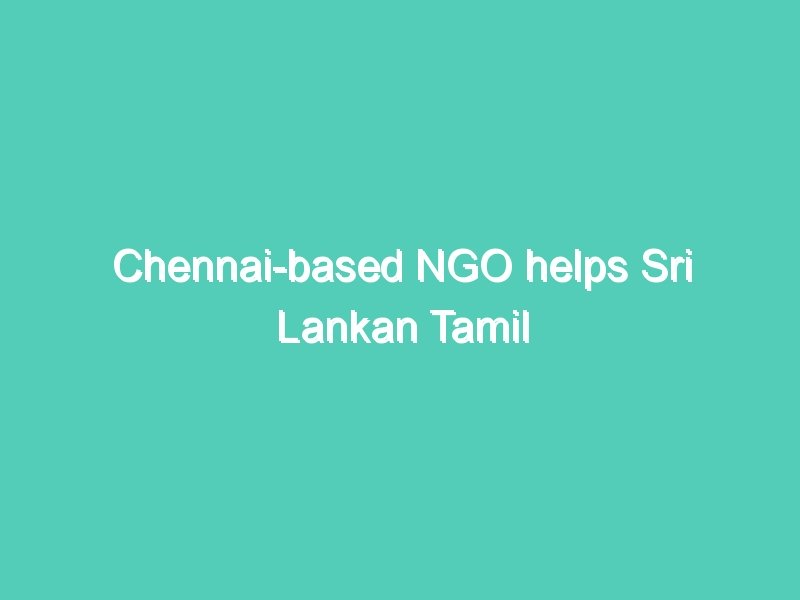KILINOCHCHI: A Chennai-based outfit, Organization for Elangai Refugees Rehabilitation (OfERR), is helping Sri Lankan Tamil refugees who have returned to their original homes in north Sri Lanka, to overcome the many difficulties they face in re-settling in their homeland.
Though the returnees are in no doubt about the correctness of their decision to come back to their own land, they do face multiple challenges in striking roots in a land devastated by war, where society is in shreds, development is tardy, and the bureaucracy is apathetic.
Wholly staffed by returnees, and dedicated to the returnees, OfERR fills a yawning gap in services and is the vital “link” between the returnees and the State.
Started in 1984 by S.C.Chandrahasan, son of the Tamil leader “Eelathu Gandhi” SJV.Chelvanayakam, to look after the 100,000-odd Sri Lankan Tamils who poured into Tamil Nadu following the ant-Tamil riots in 1983 and who were housed in 100-odd camps across the state, OfERR came to Sri Lanka following another disaster – the tsunami of December 2004.
A Sri Lankan branch named “OfERR Ceylon” under S.Sooriyakumary with a staff of returnees from Tamil Nadu was set up. Since the end of Eelam War IV in 2009, OfERR Ceylon has been encouraging the refugees in India to come back to Sri Lanka to “reclaim their land” instead living as non-citizens in India, however hospitable the host country may be.
For most of the returnees, camp life in India was a mixture of hardship and happiness. As Mrs. Sivapalasingham, wife of a fishermen of Wellamulliwaikkal put it: “It was like a Tamil film, where there would be joy and celebration one minute, and tension and pathos, the very next minute.”
The Indian government provided accommodation, albeit cramped and unhealthy. But electricity was free. Cash and dry ration were provided. Education right up to the university level was free and several refugee youth, who would never have become graduates in Sri Lanka, got degrees. Although technically the refugees could not work, they did go to work and earned some money.
For the enterprising, the sky was the limit, remembers Velayutham Pillai of Paranthan who was living in a camp in Madurai district.
“ I bought cows and supplied milk to the neighboring villages. I know of refugees who even had tippers which they hired out. Some moved about in Tata Sumos (an SUV),” he said.
But for most of the refugees, life was hard. Government’s restrictions on movement out of the camp and on taking jobs outside led to frustration and an itch to seek fresh pastures abroad, even return to Sri Lanka with all its uncertainties.
Asked why he came back, if life was good for him in Madurai, Velayutham Pillai said that he was, at heart , a farmer. He gave up my land in Viswamadu to buy a plot in Paranthan which was better. He has built a homestead on his own, but is looking to get a house under the Indian Housing Scheme which will give him a grant of LKR 550,000. A satisfactory house will however cost him upwards of LKR 800,000. But Sri Lankan banks are ready to give a loan. He has already taken LKR 200,000 from the Bank of Ceylon.
“The only problem I had here was in getting the various documents which took about three months,” Pillai said. OfERR steps in to help in such matters.
40 year old Sivakumar had fled to India in a boat in 1990 when Eelam War II broke out. Being poor, he had no option but to live in a refugee camp in Salem district.
”My life was guaranteed there, but there were restrictions on my movement. The rations doled to us were insufficient. I could not get work to supplement the dole,” he said explaining his decision to come back to Sri Lanka six month ago.
He has got his land back and is now cultivating groundnut, though for a house he only has a temporary shelter.
“The building of temporary shelters is the first and the most urgent need,” observed Tharmaratnam Sajikaran, who leads the OfERR team at Kilinochchi. “The Indian government could help in this regard,” he suggested.
Sivakumar needs to build a toilet urgently, but he is unable to get a loan.
“Officials here are indifferent as they feel that priority should be given to those local families which had been displaced due to the war,” he said in explanation.
Thangaraj Tamilchelvan has got back his two acres of land, but one acre of it is waterlogged. In the rest he cultivates paddy. He has got an allotment of a house under the Indian Housing Scheme and, to supplement the Indian grant, he has taken a loan of LKR 300,000 from a State bank, thanks to his brother who is employed in the Civil Defense Force.
“One needs to have some link with the government to get a loan application passed,” he said.
Although presently in farming, Tamilchelvan wants to be an electrician having been one back in India. He is looking for LKR 50,000 to buy the necessary tools but is unable to get a bank loan.
But Sajikaran of OfERR is advising him against opting to be an electrician. He thinks Tamilchelvan does not have the qualifications to be a locally accepted electrician. OfERR would be reluctant to give him a loan to buy electrical tools, he hinted.
“If someone wants to be an electrician, he has to work under an established electrician and get a certificate from him. It is useless to give expensive tools to a person who cannot practice. It is better for this person to pursue agriculture. I have been advising Tamilchelvan to do so,” Sajikaran said.
S.Chandravadhana, a small time garment manufacturer, is glad that she quit India.
“We led a miserable existence in a camp from 1996 to 2004. There was no work and my husband had to be a coolie. Back in my country, I make garments employing two girls, and my husband drives an auto rickshaw,” the young tailor -entrepreneur said.
Unlike Chandravadhana, Mrs.Sivapalasingham, living in the infamous killing field of Wellamulliwaikkal in Mullaitivu district, regretted leaving India.
“Initially, my husband was imprisoned because he was thought to be a boatman who brought refugees for payment. But once he established his innocence and was released, we found the people of Tamil Nadu to be exceptionally kind, always going out of the way to help the needy like us. In contrast , people here in Mulliwaikkal have been hostile to us, virtually asking us why we returned,” she said.
Sivapalasingham’s land is pat in the middle of the scene of the 2009 massacre in Eelam War IV. He is building a house there under the Indian Housing Scheme. When he dug to lay the foundation, he found a large quantity of medicine bottles, medical equipment and bones.
“ People here are so selfish, that no one came to help me remove the garbage,” he complained. Some of it, including skeletal remains, are still there for visitors to see.
“There is talk of ghosts hovering around,” Sivapalasingham said. “Perhaps that is why many new houses, some built under the Indian Housing Scheme, are still unoccupied.”
Asked why he chose to stay in an eerie place, he said: “This is all I have. I will live here,” he said unperturbed.
OfERR is helping Sivapalasingham get the necessary documents for his six school going children.
Anthonypillai Amirthathasan’s case is unique. He came back from India in 2005 his wife’s parents died in the tsunami. He joined the LTTE. Asked if he volunteered to do so, he said nonchalantly: “At that time everybody in this region was associated with it in some way and I did participate in some battles.”
When war ended in May 2009, he fled to India again, but only to come back. Today he is a marked man, hounded by the Security Forces .But his abilities as a sports referee is appreciated by the Security Forces and they refrain from detaining him.
Although he got a house under the Indian Housing Scheme, Amirthathasan is desperate to migrate to the West, though an agent in Colombo had earlier cheated him of LKR 1.3 million.
“I live under constant fear here because of the surveillance,” Amirthathasan said explaining his desperation to go abroad. Sajikaran adviced him not to try to go abroad illegally given the present clamp down on immigrants in the West.
About the conditions in Sri Lanka, Augustine R.Charles of OfERR Kilinochchi said: “There is no shortage of government schemes to help the farmer or the artisan or the returnee. But the government machinery is slow and wanting in commitment.”
Though not openly expressed, many locals, including government employees, feel that local families which were displaced several times in the course of the 30-year war and which had suffered losses of life and property especially in the last brutal phase of Eelam War IV, should be helped first.
On the kind of help OfERR provides, Sajikaran said: “Basically, we provide the returnees with links to various government agencies; make them aware of the existing schemes; advice them on how to make use of the schemes; and enable them to get the benefits. ”
The uniqueness of OfERR is that it does not wait for the returnees to come to it. OfERR goes to the returnee.
“We have what are called Welcome Groups in each area. This group, comprising returnees, contacts a new arrival the soonest and informs OfERR, which then sends a representative to contact the returning family and find out what they need,” Sajikaran said.
Asked if OfERR takes the responsibility to help every returning family, given the fact that some of the returnees are middle class folk who had lived in Tamil Nadu outside camps with money sent by relations in the West, he said that only the “really needy” are helped in a major way.
“About 10 in 50 families are fully looked after by us. However, almost 90 percent of the returnees have got our assistance in one way or the other,” he added.
Given the philosophy that the needy should be served first, OfERR is particular about right targeting.
“We make a thorough study of the returnee families, their resources, needs, interests and capabilities. We help them get materials and tools or funds only when we are sure that they will use them in the way they should be, and are not frittered away or sold,” Sajikaran said.



